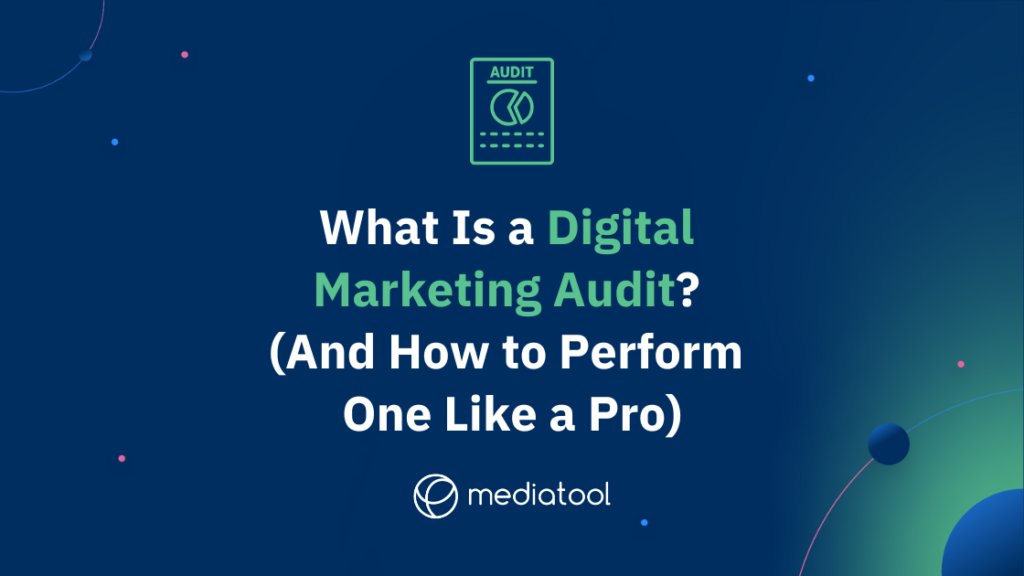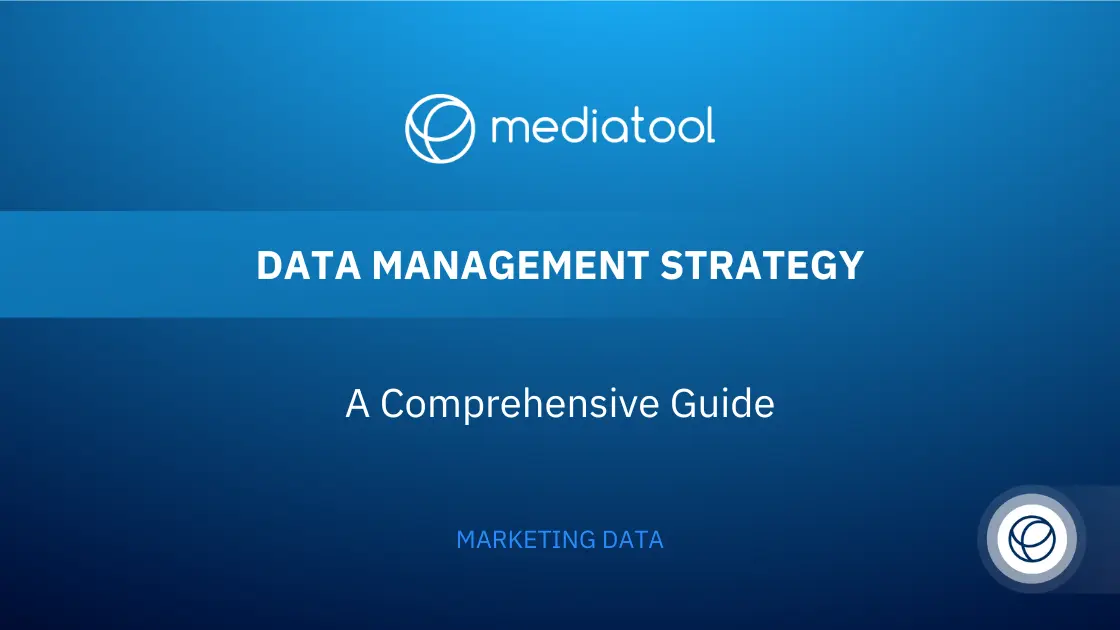As a digital marketer striving to elevate your skills or facing the challenge of conducting a digital marketing audit, understanding where to start can be daunting.
Fear not!
We’re here to offer guidance on this process, ensuring you’re well-equipped to thoroughly evaluate and enhance every facet of your digital marketing strategy.
We’ll lay the groundwork for understanding what a digital marketing audit involves, highlighting its importance in assessing and optimizing various aspects such as SEO, social media marketing, content strategy, and paid advertising campaigns. This initial step is pivotal in setting the stage for a comprehensive and effective audit, aimed at boosting your marketing efforts to their fullest potential.
But before we go any further, let’s start by better understanding what a digital marketing audit is.
What Is a Digital Marketing Audit?
A digital marketing audit is an exhaustive evaluation of your company’s digital marketing activities. It’s a thorough inspection of both qualitative and quantitative data to gauge your performance in various marketing strategies.
This process involves a comprehensive marketing audit, including an SEO audit and social media marketing audit, to identify potential growth areas and aspects needing enhancement.
This audit scrutinizes everything from website and SEO performance, including on-page and off-page SEO, to the effectiveness of social media platforms, email marketing, and paid advertising campaigns.
It assesses how these elements work together to target your audience, with a focus on key performance indicators and search engine rankings. The audit also benchmarks your efforts against industry standards, ensuring you stay competitive.
Additionally, a digital marketing audit delves into the realms of content marketing strategy, assessing the impact of your social media strategy and content marketing on platforms like Google Search and other search engines.
It also looks at technical SEO aspects, the usability of your web pages on mobile devices, and the efficiency of your marketing campaigns across different digital channels.
The outcome of a digital marketing audit should be a detailed marketing plan, including a digital marketing plan that aligns with your marketing budget and goals.
This plan should offer a clear path to improve audience engagement, enhance lead generation, and optimize conversion rate optimization, ultimately aiming to increase sales and drive high-quality subscriber growth.
In doing so, it keeps your business attuned to emerging trends, utilizes tools like Google Analytics for accurate data, and provides a roadmap for future content creation and comprehensive digital marketing efforts.
Why Do a Digital Marketing Audit? Signs You Might Need a Digital Marketing Audit
Conducting a digital marketing audit is crucial for numerous reasons. Primarily, it helps you identify areas where your marketing efforts may not be delivering the expected results, and it reveals opportunities for significant improvement.
Key Indicators for Needing a Digital Marketing Audit
1. Subpar Results from Current Marketing Efforts
If your digital marketing activities are not yielding the anticipated outcomes, this is a clear sign that an audit is necessary.
2. Lack of a Cohesive Strategy Across Channels
The absence of a unified marketing strategy across various digital channels, such as social media, email marketing, and paid advertising campaigns, indicates the need for a comprehensive review.
3. Outdated or Ineffectively Targeted Content
If your content is not up-to-date or fails to accurately target your audience, a content marketing strategy audit should be considered.
4. Ignoring Industry Trends
Falling behind on the latest trends in your industry, especially in rapidly evolving fields like social media marketing and SEO, suggests that an audit is overdue.
5. Inefficient Tracking of Performance Metrics
Not effectively tracking key performance indicators, such as conversion rate optimization, search engine rankings, and audience engagement, is a strong indicator that a marketing audit is needed.
Next Steps in Digital Marketing Auditing
Understanding these signs is just the beginning.
The next step involves undertaking a comprehensive digital marketing audit, which encompasses evaluating your SEO performance, both on-page and off-page SEO, assessing social media strategy across different platforms, and ensuring your marketing campaigns are aligned with your overall marketing plan and goals.
This process also includes a technical SEO audit, analysis of your digital channels, and a thorough review of your marketing budget and resources.
The ultimate objective of a digital marketing audit is to provide a clear roadmap for future content creation, improve lead generation, increase sales, and enhance overall digital marketing effectiveness.
It’s about gathering accurate data, performing competitive and SWOT analysis, and leveraging tools like Google Analytics to understand customer journeys and improve your online marketing strategies.
This comprehensive checklist will help you identify opportunities, fix broken links, optimize web pages for mobile devices, and keep your business abreast with emerging trends and best practices in the digital realm.
How to Perform a Digital Marketing Audit
A successful digital marketing audit should include an assessment of both your external and internal environment. On one side, you’ll analyze your competition and how they stack up against you. On the other, you’ll need to evaluate your performance across all areas of digital marketing.
Let’s take a look at each step in more detail.
Step 1: Evaluate Your Competitors
The first step in any audit is to evaluate your competition. This means doing your research to get an understanding of their strategies, tactics, and performance metrics. Take a look at their website, social media accounts, content marketing efforts, and more to identify areas where you can gain an advantage.
As we touched on a moment ago, it’s important to consider both quantitative and qualitative data, which certainly applies to conducting your competitor analysis.
Pay attention to metrics such as website traffic, search rankings, open rates, and click-through rates, but also look at the quality of their content, user experience on their site, and other elements that could give you a leg up.
Step 2: Analyze Your Digital Presence
Next, take some time to assess your digital presence. This means looking at everything from your website design and SEO to your social media accounts and content creation. Pay special attention to user experience, website speed, and keyword optimization.
As a business, it’s easy to lose sight of how our digital presence looks from the customer’s perspective. Taking time to step back and objectively assess your efforts can make all the difference when reaching new customers.
Step 3: Analyze Your Performance Metrics
Another critical element of a successful digital marketing audit is to analyze your performance metrics. Once again, this involves looking at everything from website traffic and search rankings to open and click-through rates. But this time, the focus is on how your efforts have been performing over a given period.
This is known as heuristic analysis, and it’s designed to provide you with insights into how well your digital strategies are working. The goal is to identify both areas of success and areas where improvement is needed.
It’s important to remember that these metrics will only tell you part of the story. Still, they can give you invaluable insights into how your efforts are paying off, where you may need to focus your energy, and which areas may require further attention.
Step 4: Identify Your Goals
Once you’ve analyzed both the external and internal environment, it’s time to set some goals. This is an excellent opportunity to determine what you want to achieve with your digital marketing efforts and how you plan to get there.
You can start by creating short-term and long-term goals.
For example, your short-term goal is to increase website traffic by 10%, while your long-term goal is to double your email subscribers.
Setting realistic goals can be incredibly motivating and help keep you on track. Just make sure to regularly review and adjust your objectives as needed.
Step 5: Create an Action Plan
The last step in your digital marketing audit is to create an action plan. This involves making a list of the areas that need improvement and brainstorming potential solutions.
You can create a timeline and assign tasks to the relevant team members. This will help you stay organized and ensure everyone is on the same page.
Elements Worth Auditing
A digital marketing audit is a multifaceted process, crucial for ensuring the effectiveness of your online marketing strategies. Here’s a detailed look at the essential components:
Comprehensive Marketing and SEO Audits
SEO Audit: A detailed review of both on-page and off-page SEO is essential. This includes examining keyword optimization, the structure of your web pages, and the quality of incoming links.
Technical SEO Audit: Assess technical aspects of SEO, such as site speed and mobile optimization, which impact your site’s performance in search engine results.
Content Audit: Evaluate the relevance, quality, and effectiveness of the content across all your pages. This includes identifying broken links and outdated information.
Social Media and Email Marketing Review
Social Media Audit: Analyze your social media strategy, including the effectiveness of social media campaigns and engagement levels on your social media pages.
Email Marketing Audit: Review your email marketing strategies, focusing on aspects like open rates, click-through rates, and how well they target your audience.
Digital Marketing Strategies Analysis
Marketing Channels and Media Channels Evaluation: Assess how different marketing and media channels are being used in your digital marketing plan. This includes display advertising, paid advertisements, and the integration of various digital channels.
Target Audience and Customer Journey: Understand your target audience and their customer journey, ensuring that all marketing efforts are tailored to their needs and behaviors.
Performance and Competitive Analysis
Analytics and Performance Data: Leverage tools like Google Search and Google Analytics to gather data and analyze important metrics, such as SEO rankings and website traffic.
Competitive Analysis: Compare your performance with competitors, identifying opportunities for improvement and areas where you are leading.
Comprehensive Checklists and Plans
Marketing Audit Checklist: Utilize a comprehensive checklist to ensure that every aspect of your digital marketing efforts, from social media to search engines, is thoroughly audited.
Digital Marketing Plan: Develop a strategic plan based on the audit findings, outlining steps to enhance online marketing, content marketing strategy, and overall marketing goals.
SWOT Analysis: Conduct a SWOT analysis to understand strengths, weaknesses, opportunities, and threats in relation to your organization’s industry and market position.
Additional Key Elements
Landing Pages and Top Performing Pages: Analyze the effectiveness of landing pages and identify your top-performing pages to understand where you gain most engagement and high-quality subscribers.
Insights from Related Resources and Other Sites: Look into insights and best practices from related resources and learn from the strategies implemented on other sites.
By incorporating these elements into your digital marketing audits, you can gain a comprehensive view of your digital presence, identify areas for improvement, and optimize your strategies for better engagement and increased sales.
Conducting a thorough audit will have you well on your way to creating a successful digital marketing strategy that yields the desired results.
What Are the Characteristics of a Strong Digital Marketing Audit?
An effective digital marketing audit is characterized by several crucial features, each contributing to a thorough and insightful evaluation of your digital marketing strategies. Here are the key attributes:
Comprehensive Coverage
All-Encompassing Analysis: A robust audit should cover every aspect of your digital marketing activities, from the overall marketing plan to individual marketing campaigns. This includes analyzing digital channels, email marketing, social media strategy, content marketing strategy, and SEO performance.
Performance and Strategy Review: Assess the effectiveness of each element, ensuring your digital marketing plan aligns with your marketing goals and the latest trends in online marketing.
Systematic Approach
Organized Methodology: Conduct the audit in a structured, logical manner. This includes using a marketing audit checklist and ensuring that every component, from search engine results to lead generation tactics, is examined.
Data-Driven Analysis: Focus on gathering accurate data and important metrics to make informed decisions, such as analyzing website traffic, conversion rates, and engagement metrics.
Objective Evaluation
Unbiased Review: Approach the audit with an objective mindset, free from personal biases. This ensures that decisions are based on factual data and analytics, such as Google Analytics insights and competitive analysis.
Critical Assessment: Evaluate your marketing efforts, including paid advertising campaigns, social media campaigns, and email marketing, with an impartial view.
Actionable Insights
Practical Recommendations: The audit should yield actionable insights, identifying areas for improvement and offering concrete suggestions for enhancing your digital marketing efforts.
Strategic Development: Use the findings to refine your digital marketing strategies, focusing on areas like SEO audit results, content marketing effectiveness, and social media marketing performance.
Independent Execution
Independent Review: Conduct the audit independently from the team that devised the campaigns. This helps in identifying opportunities and weaknesses without internal influence or bias.
External Perspective: An independent audit can offer fresh perspectives, especially in areas like technical SEO, display advertising, and user experience on mobile devices and web pages.
By incorporating these characteristics, a digital marketing audit becomes a powerful tool, providing a comprehensive, objective, and actionable roadmap to optimize your digital marketing activities and achieve better results.
Make Your Digital Marketing Audit Count with Mediatool
A digital marketing audit is only as good as its implementation. To ensure you’re getting the most out of your audit, bring in Mediatool to help you make sense of the data and recommend actionable steps. Mediatool helps automate and streamline the process, so you can focus on optimizing your digital marketing strategies and driving results.





